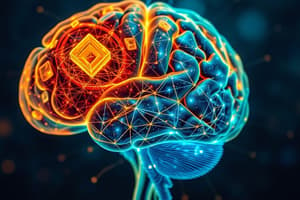Podcast
Questions and Answers
What does intelligence refer to?
What does intelligence refer to?
- The predisposition towards emotional responses.
- The ability to memorize information.
- The capacity for physical strength.
- The sum total of all cognitive processes and skills. (correct)
Which cognitive processes are related to human intelligence?
Which cognitive processes are related to human intelligence?
- Physical coordination and balance.
- Artistic creativity and performance.
- Social interaction and emotional expression.
- Concept formation, reasoning, and memory. (correct)
What percentage range of intelligence is believed to be influenced by genetics?
What percentage range of intelligence is believed to be influenced by genetics?
- 40% to 80% (correct)
- 80% to 100%
- 0% to 20%
- 20% to 40%
What aspect of nutrition is linked to brain structure and intelligence?
What aspect of nutrition is linked to brain structure and intelligence?
What role does the caudate play in relation to intelligence?
What role does the caudate play in relation to intelligence?
Which type of fatty acids are linked to higher intelligence and achievement scores in offspring?
Which type of fatty acids are linked to higher intelligence and achievement scores in offspring?
How does nutrition after birth affect brain structure?
How does nutrition after birth affect brain structure?
What is the ongoing debate regarding human intelligence?
What is the ongoing debate regarding human intelligence?
Which activity is most effective for someone with strong Musical Intelligence?
Which activity is most effective for someone with strong Musical Intelligence?
What might suggest a learner has strong Visual/Spatial Intelligence?
What might suggest a learner has strong Visual/Spatial Intelligence?
Which of the following activities best supports someone with Bodily Kinesthetic Intelligence?
Which of the following activities best supports someone with Bodily Kinesthetic Intelligence?
What is a characteristic behavior of someone with strong Interpersonal Intelligence?
What is a characteristic behavior of someone with strong Interpersonal Intelligence?
Which method is least likely to help a Visual/Spatial learner?
Which method is least likely to help a Visual/Spatial learner?
Which activity aligns with both Musical and Visual/Spatial Intelligence?
Which activity aligns with both Musical and Visual/Spatial Intelligence?
A learner interested in maps and charts is likely to have which type of intelligence?
A learner interested in maps and charts is likely to have which type of intelligence?
What method would best support a learner with strong Bodily Kinesthetic Intelligence during study sessions?
What method would best support a learner with strong Bodily Kinesthetic Intelligence during study sessions?
What is the IQ range that categorizes individuals as 'Gifted Children'?
What is the IQ range that categorizes individuals as 'Gifted Children'?
Which type of intelligence is associated with being 'Word Smart'?
Which type of intelligence is associated with being 'Word Smart'?
According to Gardner’s theory, which of the following is NOT one of the eight types of intelligences?
According to Gardner’s theory, which of the following is NOT one of the eight types of intelligences?
What does the term 'jack of all trades' imply in relation to intelligence?
What does the term 'jack of all trades' imply in relation to intelligence?
Which IQ classification corresponds to 'Morons'?
Which IQ classification corresponds to 'Morons'?
What aspect of intelligence is highlighted by Howard Gardner's theory?
What aspect of intelligence is highlighted by Howard Gardner's theory?
Which of the following is a description of logical-mathematical intelligence?
Which of the following is a description of logical-mathematical intelligence?
What kind of intelligence is characterized by a deep connection with nature?
What kind of intelligence is characterized by a deep connection with nature?
What is a characteristic of individuals with strong Interpersonal Intelligence?
What is a characteristic of individuals with strong Interpersonal Intelligence?
Which learning method would be most effective for someone with strong Intrapersonal Intelligence?
Which learning method would be most effective for someone with strong Intrapersonal Intelligence?
What enhances the learning experience for those with Naturalist Intelligence?
What enhances the learning experience for those with Naturalist Intelligence?
How does the traditional view of intelligence differ from the Multiple Intelligence Theory?
How does the traditional view of intelligence differ from the Multiple Intelligence Theory?
Which activities would likely be least beneficial for someone with strong Intrapersonal Intelligence?
Which activities would likely be least beneficial for someone with strong Intrapersonal Intelligence?
What are individuals with strong Interpersonal Intelligence likely to excel in?
What are individuals with strong Interpersonal Intelligence likely to excel in?
Which of the following statements aligns with the Multiple Intelligence Theory?
Which of the following statements aligns with the Multiple Intelligence Theory?
What is a common method that enhances the learning for individuals with Naturalist Intelligence?
What is a common method that enhances the learning for individuals with Naturalist Intelligence?
What is a key difference between the traditional view of intelligence and the multiple intelligence theory?
What is a key difference between the traditional view of intelligence and the multiple intelligence theory?
How does the multiple intelligence theory suggest teachers should assess students?
How does the multiple intelligence theory suggest teachers should assess students?
In the context of multiple intelligences, what should teachers do to enhance learning?
In the context of multiple intelligences, what should teachers do to enhance learning?
What role does understanding students' uniqueness play in multiple intelligence pedagogy?
What role does understanding students' uniqueness play in multiple intelligence pedagogy?
What potential benefit does the multiple intelligence theory provide to teachers?
What potential benefit does the multiple intelligence theory provide to teachers?
Which of the following is NOT a suggested method in multiple intelligence pedagogy?
Which of the following is NOT a suggested method in multiple intelligence pedagogy?
According to multiple intelligence theory, how do intelligence levels change over a lifetime?
According to multiple intelligence theory, how do intelligence levels change over a lifetime?
Which learning pathway is NOT mentioned in relation to facilitating effective learning?
Which learning pathway is NOT mentioned in relation to facilitating effective learning?
Study Notes
What is Intelligence?
- Defined as the sum total of cognitive processes and skills.
- Involves learning from experience, reasoning, and adapting to social demands.
- Higher-order cognition includes concept formation, reasoning, problem-solving, idea creation, memory, and perception.
- Involves acquiring, recalling, and using knowledge to understand concrete and abstract concepts and their relationships.
- Genetic influence on intelligence and IQ is estimated to be 40-80%.
- Prenatal and early nutrition significantly impact brain structure, behavior, and intelligence. Increased nutrition, particularly post-birth, correlates with a larger caudate nucleus, crucial for learning and memory and linked to higher verbal IQ scores. Diets rich in DHA and EPA during pregnancy and lactation are associated with higher intelligence and achievement test scores in children at ages 4 and 7.
- IQ ranges and associated terms: Above 130 = Genius; 120-130 = Gifted; 110-120 = Above Average; 90-110 = Average; 80-90 = Moron; 70-80 = Imbecile; 60-70 = Idiot *(Note: These terms are outdated and considered offensive).
Multiple Intelligences Theory
- Proposed by Howard Gardner.
- Defines intelligence as the ability to solve problems or create valuable products within a cultural context.
- Individuals may possess different types of intelligence, and can have more than one.
- Eight types of intelligence:
- Verbal-linguistic (word smart)
- Logical-mathematical (logic smart)
- Musical-rhythmic (music smart)
- Visual-spatial (picture smart)
- Bodily-kinesthetic (body smart)
- Interpersonal (people smart)
- Intrapersonal (self smart)
- Naturalistic (nature smart)
- Emphasizes that traditional IQ testing is limited.
- Suggests diverse learning styles and that individuals can improve in all intelligence types.
Differences between Traditional and Multiple Intelligences Views
| Traditional View of Intelligence | Multiple Intelligence Theory | |
|---|---|---|
| Measurement | Short answer tests | Short answer tests are insufficient, as they only assess rote memorization. |
| Teaching Approach | Same material for everyone | Differentiated teaching based on individual strengths and weaknesses |
| Intelligence Level | Fixed throughout life | Improvable throughout life |
| Nature of Intelligence | Primarily logic and language | Multiple types reflecting diverse interactions with the world |
| Teaching Methodology | Teacher-centered topic or subject delivery. | Issue/question-based, interdisciplinary approach; valuing various understanding pathways. |
Teaching and Learning with Multiple Intelligences
- Eight potential learning pathways.
- Adapting teaching methods to cater to different intelligences (music, cooperative learning, art, role-play, multimedia, field trips, reflection).
- Connecting learning across different intelligences; e.g., use words to describe a numerical pattern.
Studying That Suits You
Use AI to generate personalized quizzes and flashcards to suit your learning preferences.
Related Documents
Description
Explore the multifaceted concept of intelligence, which encompasses cognitive processes such as reasoning, problem-solving, and learning from experience. This quiz delves into the genetic and environmental factors affecting intelligence, including nutrition impacts on brain development and IQ variations. Test your knowledge on how intelligence is defined and measured across different contexts.




